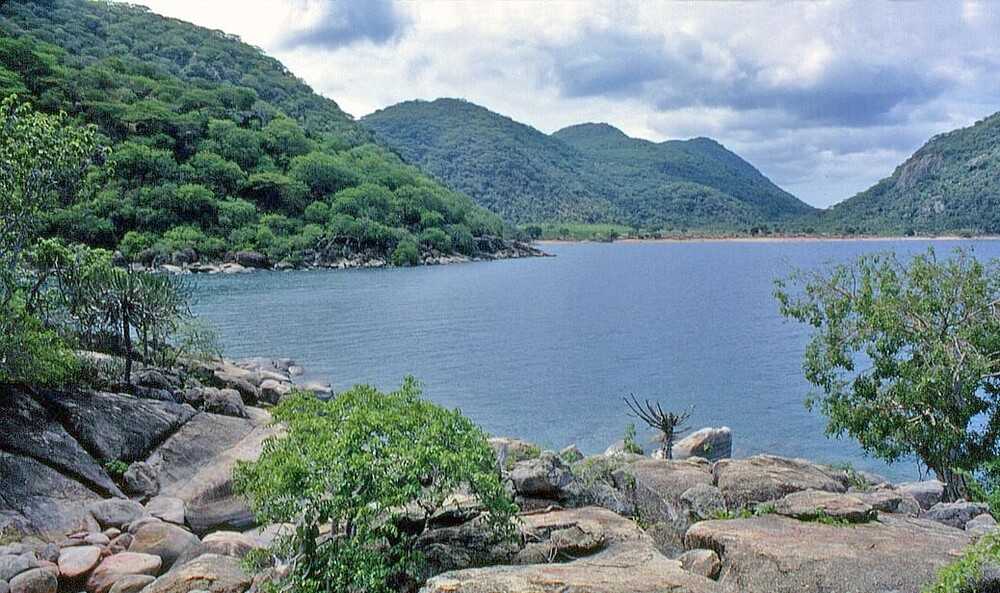Malawi - MW - MWI - MAW - Africa
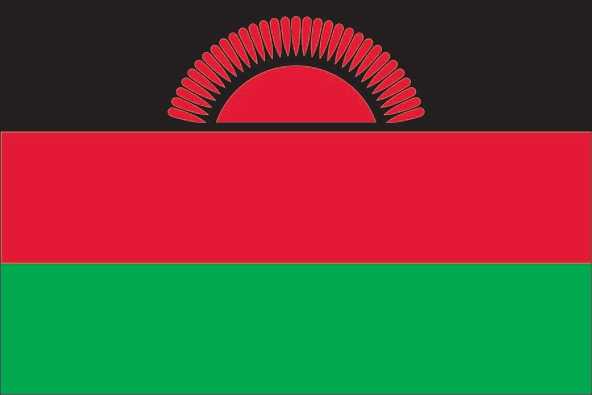
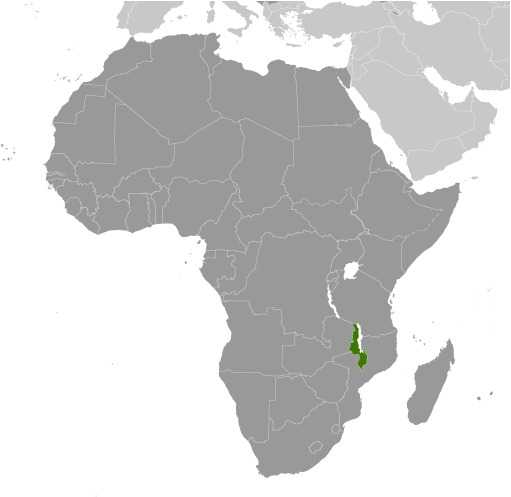
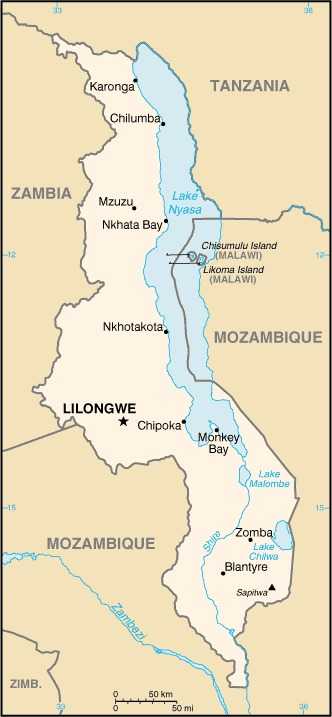
Malawi Images
Malawi Factbook Data
Diplomatic representation from the US
embassy: 16 Jomo Kenyatta Road, Lilongwe 3
mailing address: 2280 Lilongwe Place, Washington DC 20521-2280
telephone: [265] (0) 177-3166
FAX: [265] (0) 177-0471
email address and website:
LilongweConsular@state.gov
https://mw.usembassy.gov/
Age structure
15-64 years: 58.4% (male 6,217,761/female 6,487,273)
65 years and over: 3.9% (2024 est.) (male 376,266/female 468,732)
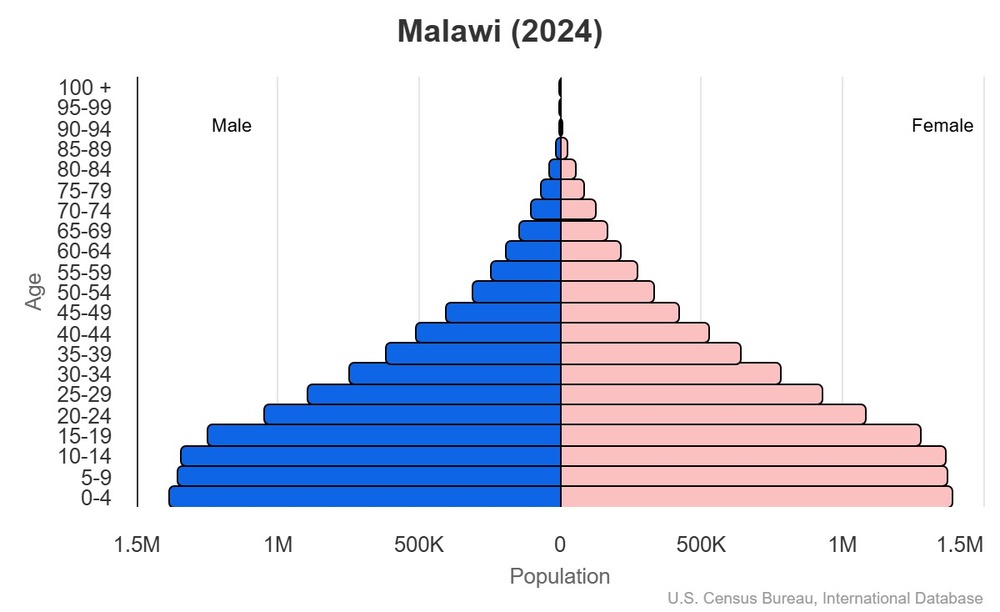
For additional information, please see the entry for Population pyramid on the Definitions and Notes page.
Geographic coordinates
Sex ratio
0-14 years: 0.99 male(s)/female
15-64 years: 0.96 male(s)/female
65 years and over: 0.8 male(s)/female
total population: 0.96 male(s)/female (2024 est.)
Natural hazards
Area - comparative
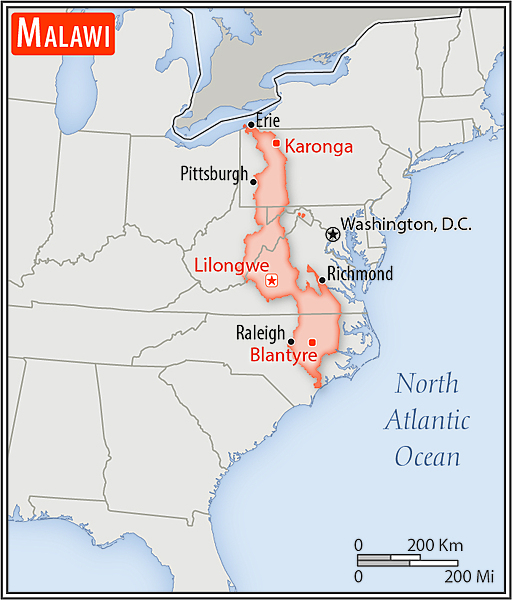
slightly smaller than Pennsylvania
Military service age and obligation
Background
Malawi shares its name with the Chewa word for flames and is linked to the Maravi people from whom the Chewa language originated. The Maravi settled in what is now Malawi around 1400, during one of the later waves of Bantu migration across central and southern Africa. A powerful Maravi kingdom established around 1500 reached its zenith around 1700, when it controlled what is now southern and central Malawi and portions of neighboring Mozambique and Zambia. The kingdom eventually declined because of destabilization from the escalating global trade in enslaved people. In the early 1800s, widespread conflict in southern Africa displaced various ethnic Ngoni groups, some of which moved into Malawi and further undermined the Maravi. Members of the Yao ethnic group -- which had long traded with Malawi from Mozambique -- introduced Islam and began to settle in Malawi in significant numbers in the mid-1800s, followed by members of the Lomwe ethnic group. British missionary and trading activity increased in the area around Lake Nyasa in the mid-1800s, and in 1891, Britain declared a protectorate called British Central Africa over what is now Malawi. The British renamed the territory Nyasaland in 1907, and it was part of the colonial Federation of Rhodesia and Nyasaland -- including present-day Zambia and Zimbabwe -- from 1953 to 1963 before gaining independence as Malawi in 1964.
Hastings Kamuzu BANDA served as prime minister at independence and then as president when the country became a republic in 1966. He later instituted one-party rule under his Malawi Congress Party (MCP) and was declared president for life. After three decades of one-party rule, the country held multiparty presidential and parliamentary elections in 1994 under a provisional constitution that came into full effect the following year. Bakili MULUZI of the United Democratic Front party became the first freely elected president of Malawi when he defeated BANDA at the polls in 1994; he won reelection in 1999. President Bingu wa MUTHARIKA was elected in 2004 and reelected to a second term in 2009. He died abruptly in 2012 and was succeeded by Vice President Joyce BANDA. MUTHARIKA's brother, Peter MUTHARIKA, defeated BANDA in the election in 2014. Peter MUTHARIKA was reelected in a disputed election in 2019 that resulted in countrywide protests. The courts ordered a new election, and in 2020, Lazarus CHAKWERA of the MCP was elected president. Population growth, increasing pressure on agricultural lands, corruption, and HIV/AIDS pose major problems for Malawi.
Environmental issues
International environmental agreements
signed, but not ratified: none of the selected agreements
Military expenditures
1% of GDP (2023 est.)
0.8% of GDP (2022 est.)
0.9% of GDP (2021 est.)
0.9% of GDP (2020 est.)
Population below poverty line
note: % of population with income below national poverty line
Household income or consumption by percentage share
highest 10%: 31% (2019 est.)
note: % share of income accruing to lowest and highest 10% of population
Exports - commodities
note: top five export commodities based on value in dollars
Exports - partners
note: top five export partners based on percentage share of exports
Administrative divisions
Agricultural products
note: top ten agricultural products based on tonnage
Military and security forces
Ministry of Homeland Security: Malawi Police Service (2025)
note: the MDF reports directly to the president as commander in chief
Budget
expenditures: $3.523 billion (2022 est.)
note: central government revenues and expenses (excluding grants/extrabudgetary units/social security funds) converted to US dollars at average official exchange rate for year indicated
Capital
geographic coordinates: 13 58 S, 33 47 E
time difference: UTC+2 (7 hours ahead of Washington, DC, during Standard Time)
etymology: named after the Lilongwe River that flows through the city; the origin of the river's name is unclear
Imports - commodities
note: top five import commodities based on value in dollars
Climate
Coastline
Constitution
amendment process: proposed by the National Assembly; passage of amendments affecting constitutional articles, including the sovereignty and territory of the state, fundamental constitutional principles, human rights, voting rights, and the judiciary, requires majority approval in a referendum and majority approval by the Assembly; passage of other amendments requires at least two-thirds majority vote of the Assembly
Exchange rates
Exchange rates:
1,161.094 (2023 est.)
949.039 (2022 est.)
805.9 (2021 est.)
749.527 (2020 est.)
745.541 (2019 est.)
Flag
meaning: black stands for ethnic groups, red for the blood shed in the struggle for freedom, and green for nature; the sun represents the hope of freedom for the continent of Africa
Independence
Industries
Judicial branch
judge selection and term of office: Supreme Court chief justice appointed by the president and confirmed by the National Assembly; other judges appointed by the president on the recommendation of the Judicial Service Commission, which regulates judicial officers; judges serve until age 65
subordinate courts: High Court; magistrate courts; Industrial Relations Court; district and city traditional or local courts
Land boundaries
border countries (3): Mozambique 1,498 km; Tanzania 512 km; Zambia 847 km
Land use
arable land: 42.4% (2023 est.)
permanent crops: 2.1% (2023 est.)
permanent pasture: 19.6% (2023 est.)
forest: 22.4% (2023 est.)
other: 13.4% (2023 est.)
Legal system
Legislative branch
legislative structure: unicameral
number of seats: 229 (all directly elected)
electoral system: plurality/majority
scope of elections: full renewal
term in office: 5 years
most recent election date: 9/16/2025
parties elected and seats per party: Democratic Progressive Party (DPP) (78); Malawi Congress Party (MCP) (52); Independents (73); Other (21)
percentage of women in chamber: 21.4%
expected date of next election: September 2025
Literacy
male: 78.6% (2020 est.)
female: 62.7% (2020 est.)
Maritime claims
International organization participation
National holiday
note: also called Republic Day since 6 July 1966
Nationality
adjective: Malawian
Natural resources
Geography - note
Economic overview
Political parties
Malawi Congress Party or MCP
People's Party or PP
United Democratic Front or UDF
United Transformation Movement or UTM
Railways
narrow gauge: 767 km (2014) 1.067-m gauge
Suffrage
Terrain
Government type
Country name
conventional short form: Malawi
local long form: Dziko la Malawi
local short form: Malawi
former: British Central African Protectorate, Nyasaland Protectorate, Nyasaland
etymology: named for the Maravi people who inhabited the area since the 14th century; the word maravi means "flames"
Location
Map references
Irrigated land
Diplomatic representation in the US
chancery: 2408 Massachusetts Avenue NW, Washington, DC 20008
telephone: [1] (202) 451- 0409
email address and website:
malawidc@aol.com
Home | Malawi Embassy USA
Internet users
Internet country code
Refugees and internally displaced persons
IDPs: 135,728 (2024 est.)
GDP (official exchange rate)
note: data in current dollars at official exchange rate
Total renewable water resources
School life expectancy (primary to tertiary education)
male: 10 years (2021 est.)
female: 10 years (2021 est.)
Urbanization
rate of urbanization: 4.41% annual rate of change (2020-25 est.)
Broadcast media
Drinking water source
urban: 85.9% of population (2022 est.)
rural: 68.8% of population (2022 est.)
total: 71.9% of population (2022 est.)
unimproved:
urban: 14.1% of population (2022 est.)
rural: 31.2% of population (2022 est.)
total: 28.1% of population (2022 est.)
National anthem(s)
lyrics/music: Michael-Fredrick Paul SAUKA
history: adopted 1964
Major urban areas - population
International law organization participation
Physician density
National symbol(s)
Mother's mean age at first birth
note: data represents median age at first birth among women 20-49
Citizenship
citizenship by descent only: at least one parent must be a citizen of Malawi
dual citizenship recognized: no
residency requirement for naturalization: 7 years
Population distribution
Electricity access
electrification - urban areas: 54%
electrification - rural areas: 5.6%
Civil aircraft registration country code prefix
Sanitation facility access
urban: 87.1% of population (2022 est.)
rural: 73.4% of population (2022 est.)
total: 75.8% of population (2022 est.)
unimproved:
urban: 12.9% of population (2022 est.)
rural: 26.6% of population (2022 est.)
total: 24.2% of population (2022 est.)
Ethnic groups
Religions
Languages
note: Chewa and Nyanja are mutually intelligible dialects; Nkhonde and Nyakyusa are mutually intelligible dialects
Imports - partners
note: top five import partners based on percentage share of imports
Elevation
lowest point: junction of the Shire River and international boundary with Mozambique 37 m
mean elevation: 779 m
Health expenditure
3.3% of national budget (2022 est.)
Military and security service personnel strengths
Military equipment inventories and acquisitions
Military deployments
Total water withdrawal
industrial: 47.7 million cubic meters (2022 est.)
agricultural: 1.166 billion cubic meters (2022 est.)
Waste and recycling
percent of municipal solid waste recycled: 9.6% (2022 est.)
Major watersheds (area sq km)
Indian Ocean drainage: Zambezi (1,332,412 sq km)
Major lakes (area sq km)
salt water lake(s): Lake Chilwa - 1,040 sq km
Major rivers (by length in km)
note: [s] after country name indicates river source; [m] after country name indicates river mouth
Military - note
the MDF was established in 1964 from elements of the Kings African Rifles (KAR), a British colonial regiment raised from Great Britain's various possessions in East Africa from 1902 until independence in the 1960s; the KAR conducted both military and internal security functions within the colonial territories, and served outside the territories during the World Wars (2025)
National heritage
selected World Heritage Site locales: Lake Malawi National Park (n); Chongoni Rock-Art Area (c); Mount Mulanje Cultural Landscape (c)
Coal
consumption: 22,000 metric tons (2023 est.)
imports: 19,000 metric tons (2023 est.)
proven reserves: 801.999 million metric tons (2023 est.)
Electricity generation sources
solar: 0.7% of total installed capacity (2023 est.)
hydroelectricity: 92.2% of total installed capacity (2023 est.)
biomass and waste: 3% of total installed capacity (2023 est.)
Petroleum
Child marriage
women married by age 18: 37.7% (2020)
men married by age 18: 7% (2020)
Gross reproduction rate
Currently married women (ages 15-49)
Remittances
2.1% of GDP (2022 est.)
2.6% of GDP (2021 est.)
note: personal transfers and compensation between resident and non-resident individuals/households/entities
National color(s)
Particulate matter emissions
Labor force
note: number of people ages 15 or older who are employed or seeking work
Youth unemployment rate (ages 15-24)
male: 6.4% (2024 est.)
female: 7.1% (2024 est.)
note: % of labor force ages 15-24 seeking employment
Net migration rate
Median age
male: 20 years
female: 20.6 years
Debt - external
note: present value of external debt in current US dollars
Maternal mortality ratio
Reserves of foreign exchange and gold
$846.84 million (2019 est.)
$766.155 million (2018 est.)
note: holdings of gold (year-end prices)/foreign exchange/special drawing rights in current dollars
Public debt
note: central government debt as a % of GDP
Total fertility rate
Unemployment rate
5.1% (2023 est.)
5.1% (2022 est.)
note: % of labor force seeking employment
Carbon dioxide emissions
from coal and metallurgical coke: 65,000 metric tonnes of CO2 (2023 est.)
from petroleum and other liquids: 2.2 million metric tonnes of CO2 (2023 est.)
Area
land: 94,080 sq km
water: 24,404 sq km
Taxes and other revenues
note: central government tax revenue as a % of GDP
Real GDP (purchasing power parity)
$34.789 billion (2023 est.)
$34.143 billion (2022 est.)
note: data in 2021 dollars
Airports
Infant mortality rate
male: 36.4 deaths/1,000 live births
female: 27.4 deaths/1,000 live births
Gini Index coefficient - distribution of family income
note: index (0-100) of income distribution; higher values represent greater inequality
Inflation rate (consumer prices)
28.8% (2023 est.)
21% (2022 est.)
note: annual % change based on consumer prices
Current account balance
-$2.218 billion (2022 est.)
-$1.918 billion (2021 est.)
note: balance of payments - net trade and primary/secondary income in current dollars
Real GDP per capita
$1,600 (2023 est.)
$1,700 (2022 est.)
note: data in 2021 dollars
Broadband - fixed subscriptions
subscriptions per 100 inhabitants: (2023 est.) less than 1
Tobacco use
male: 11.7% (2025 est.)
female: 1.4% (2025 est.)
Obesity - adult prevalence rate
Energy consumption per capita
Death rate
Birth rate
Electricity
consumption: 1.585 billion kWh (2023 est.)
exports: 19.938 million kWh (2023 est.)
transmission/distribution losses: 231.785 million kWh (2023 est.)
Children under the age of 5 years underweight
Imports
$3.834 billion (2022 est.)
$3.768 billion (2021 est.)
note: balance of payments - imports of goods and services in current dollars
Exports
$1.487 billion (2022 est.)
$1.587 billion (2021 est.)
note: balance of payments - exports of goods and services in current dollars
Alcohol consumption per capita
beer: 0.08 liters of pure alcohol (2019 est.)
wine: 0 liters of pure alcohol (2019 est.)
spirits: 0.25 liters of pure alcohol (2019 est.)
other alcohols: 1.7 liters of pure alcohol (2019 est.)
Life expectancy at birth
male: 69.9 years
female: 76.1 years
Real GDP growth rate
1.9% (2023 est.)
0.9% (2022 est.)
note: annual GDP % growth based on constant local currency
Industrial production growth rate
note: annual % change in industrial value added based on constant local currency
GDP - composition, by sector of origin
industry: 16% (2024 est.)
services: 44.9% (2024 est.)
note: figures may not total 100% due to non-allocated consumption not captured in sector-reported data
Education expenditure
16% national budget (2024 est.)
Population growth rate
Executive branch
head of government: President Peter MUTHARIKA (since 4 October 2025)
cabinet: Cabinet named by the president
election/appointment process: president directly elected by simple-majority popular vote for a 5-year term (eligible for a second term)
most recent election date: September 2030
election results: 2025: Peter MUTHARIKA elected president; percent of vote- Peter MUTHARIKA (DPP) 56.8%, Lazarus CHAKWERA (MCP) 33.0%, Dalitso KABAMBE (UTM) 3.95, Atupele MULUZI (UDF) 1.92%, Joyce BANDA (PP) 1.61%, other 2.72%
2020: Lazarus CHAKWERA elected president; Lazarus CHAKWERA (MCP) 59.3%, Peter Mutharika (DPP) 39.9%, other 0.8%
expected date of next election: September 2030
note: the president is both chief of state and head of government
Telephones - mobile cellular
subscriptions per 100 inhabitants: 69 (2024 est.)
Dependency ratios
youth dependency ratio: 68.3 (2025 est.)
elderly dependency ratio: 6 (2025 est.)
potential support ratio: 16.6 (2025 est.)
Population
male: 10,097,082
female: 10,453,872
Telephones - fixed lines
subscriptions per 100 inhabitants: (2024 est.) less than 1
